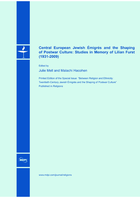Between Religion and Ethnicity: Twentieth-Century Jewish Émigrés and the Shaping of Postwar Culture
A special issue of Religions (ISSN 2077-1444).
Deadline for manuscript submissions: closed (31 December 2011) | Viewed by 95195
Special Issue Editors
Interests: Jewish studies; medieval european history
Interests: European intellectual history; Jewish studies
Special Issues, Collections and Topics in MDPI journals
Special Issue Information
Dear Colleagues,
The European Jewish émigrés from Nazi Germany and Europe have emerged in the last two decades as a major interdisciplinary research field. They made important theoretical contributions to twentieth-century philosophy and scholarship and helped shape postwar national and international cultures, in Europe and the U.S. This special issue explores the nexus of Jewish religion, ethnicity, and culture in the émigrés' life and scholarship. Mostly secular, often paying little attention to their own Jewishness, the émigrés display in full the complex relationship between Judaism and Jewish identity. They provide scholars with opportunities for deciphering the Jewish dimension in the making of postwar cultures and for rethinking the meaning of "Jewish" for a group denying the significance of religion and ethnicity – their own first and foremost. The issue grew out of an April 2011 conference at the National Humanities Center in memory of Lilian Furst (1931-2009), former UNC professor of comparative literature, an Austrian émigré to Britain and the U.S. whose work exemplified the role of religion, ethnicity and culture in the making of contemporary scholarship. Scholars from a wide range of disciplines in the humanities and social sciences are invited to submit articles for the issue addressing religion, ethnicity, and culture in the lives and work of twentieth-century Jewish émigrés.
Dr. Julie Mell
Dr. Malachi Hacohen
Guest Editors
Keywords
- Jewish émigrés
- Jewish refuges
- Judentum
- Judaism
- ethnicity
- Heimat
- homeland
- dilemma of modern Jewish identity
- modern Jewish history
- twentieth-century







